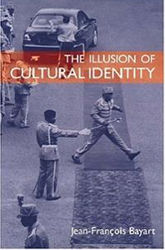 “A great many anthropological and historical studies have shown that pre-colonial societies were almost always mutli-ethnic, and included a great diversity of cultural repertoires; that the principal forms of social or religious mobilisation were trans-ethnic; and that ancient Africa most definitely did not consist of a mosaic of ethnic groups. This does not mean that ethnicity is a pure construct … produced by colonising powers that sought to divide the better to rule, as African nationalists — and, paradoxically, some ethno-nationalists — still like to believe. Colonised peoples took part in its ‘formation’ by appropriating the new political, cultural and economic resources of the bureaucratic state. In one of the many working misunderstandings, ‘Europeans believed Africans belonged to tribes; [whereas] Africans built tribes to belong to’, as John Iliffe brilliantly expressed it.* The political importance of ethnicity proceeds precisely from the fact that it is an eminently modern phenomenon connected to the ‘imported state’, and not a residue or resurgence of ‘traditional culture’.” (29-30)
“A great many anthropological and historical studies have shown that pre-colonial societies were almost always mutli-ethnic, and included a great diversity of cultural repertoires; that the principal forms of social or religious mobilisation were trans-ethnic; and that ancient Africa most definitely did not consist of a mosaic of ethnic groups. This does not mean that ethnicity is a pure construct … produced by colonising powers that sought to divide the better to rule, as African nationalists — and, paradoxically, some ethno-nationalists — still like to believe. Colonised peoples took part in its ‘formation’ by appropriating the new political, cultural and economic resources of the bureaucratic state. In one of the many working misunderstandings, ‘Europeans believed Africans belonged to tribes; [whereas] Africans built tribes to belong to’, as John Iliffe brilliantly expressed it.* The political importance of ethnicity proceeds precisely from the fact that it is an eminently modern phenomenon connected to the ‘imported state’, and not a residue or resurgence of ‘traditional culture’.” (29-30)
*John Iliffee, A Modern History of Tanganyika (Cambridge University Press, 1979, p. 324). The role of African middlemen, especially the literate ones, in the process of colonial ‘imagination’ of ethnicity is now better understood than a few years ago, when emphasis was placed on the intervention of European administrators and missionaries….
[This is one of a series of posts, quoting from Bayart’s The Illusion of Cultural Identity, that further documents the theoretical basis
on which Culture on the Edge is working.]
By Matt Sheedy



 “Faced with Franciscans who deployed an evangelism of a culturalist type and sought to legitimise authochthonous civilisation to the point of taking care to respect its established hierarchy, the sedentary natives of New Spain chose to submit and to accept the Europeans’ religion. However, they converted ‘in order to remain Indians’. The
“Faced with Franciscans who deployed an evangelism of a culturalist type and sought to legitimise authochthonous civilisation to the point of taking care to respect its established hierarchy, the sedentary natives of New Spain chose to submit and to accept the Europeans’ religion. However, they converted ‘in order to remain Indians’. The